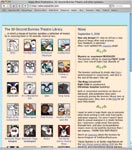1. Automotive News Service
Trying to stay current on the latest news in the automotive industry? Take a look at Automotive Digest online. Here you'll find news and analysis on a variety of automotive topics, including vehicle safety, manufacturers, and energy/environmental issues. I especially like the fact that each industry news story includes the source of the story, a summary of the situation, important quotes, and significant points in the cited story, along with links to the original articles and related Web sites. You can also sign up for targeted e-newsletters. Note: a free registration is required to view the content.
 |
2. Online MEMS Library
Thank you to Mehran Mehregany from Case Western Reserve University for telling me about the university's MEMS World Online MEMS-specific digital library. You can search for experts in specific MEMS-related fields; search abstracts from journals, conferences, and patents to find relevant literature; identify which institutions specialize in MEMS research (and which sub-topics, e.g., micromachining, sensors, and materials research); and even profile the researchers.
 |
http://memsworldonline.case.edu
3. Movie Reenactments
Should you find yourself with snippets of free time, wander over to Angry Alien Productions and view some of the movie reenactments on offer. All of them are 30 seconds long and acted by cartoon bunnies. The quality is a bit uneven, but some of them are sheer genius.
 |
Planning Algorithms
Author: Steven M. LaValle
Publisher: Cambridge University Press
ISBN: 0-521-86205-1
Page count: 826
While this book is written primarily for advanced-undergraduate-or beginning-graduate-level students (dealing, as it does, with planning algorithms in robotics, artificial intelligence, and control theory), it can also serve as an introduction for researchers and others working in the three fields mentioned. It discusses planning for robots, including motion and trajectory planning, as well as planning under uncertainty; artificial intelligence, as planning complements machine learning; control theory for open-loop control, feasibility, and dynamics; and computer graphics, especially animation.
 |
There are four main sections. Introductory Material (chapters 1 and 2); Motion Planning (chapters 3–8), which includes material on sampling-based, combinatorial, and feedback motion planning; Decision-Theoretic Planning (chapters 9–12), which deals with basic and sequential decision theory, sensors and information spaces, and planning under sensing uncertainty; and finally Planning Under Differential Constraints (chapters 13–15), which addresses differential models, sampling-based planning under differential constraints, and system theory and analytical techniques.
There are exercises at the end of each chapter, and many examples and figures scattered throughout the pages. The material, developed from the author's courses, is clearly written and mixes theory with relevant technical aspects.